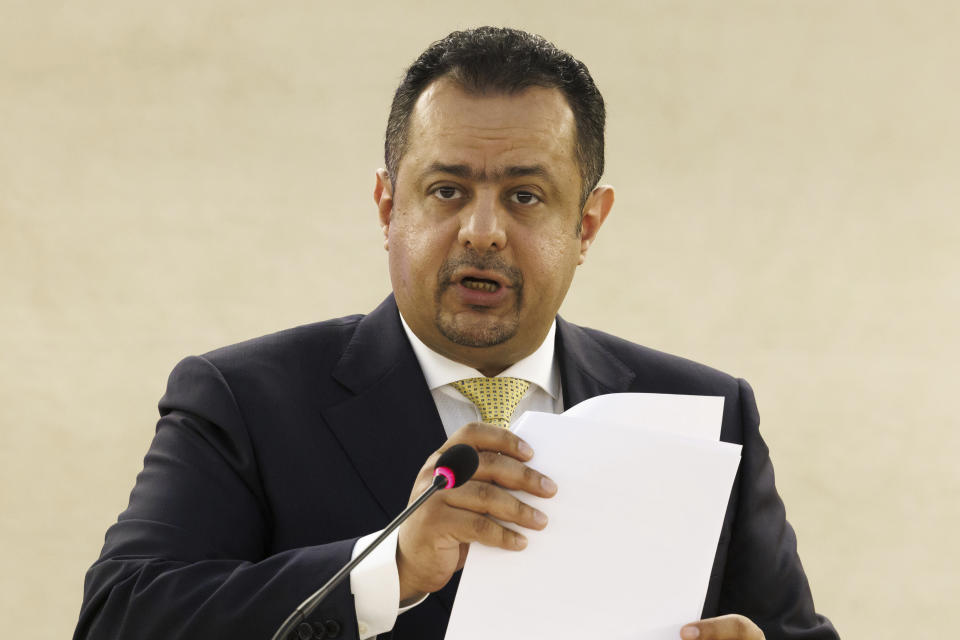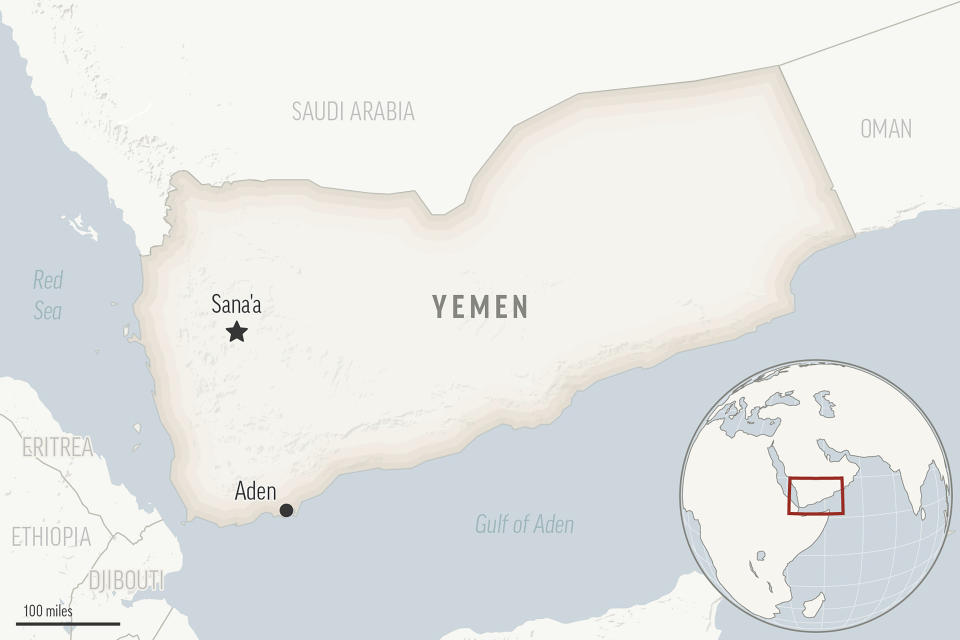UN raises $1.2 billion for Yemen, far below its 2023 target
- Oops!Something went wrong.Please try again later.
CAIRO (AP) — Global donors on Monday pledged about $1.2 billion at a conference aimed at generating funds to help millions of people in Yemen suffering from the fallout of an eight-year civil war, a U.N. official said. The amount is far below a target of $4.3 billion set by the United Nations to stave off one of the world’s worst humanitarian crises.
More than 21 million people in Yemen, or two-thirds of the country’s population, need help and protection, according to the U.N. Office for the Coordination of Humanitarian Affairs, or OCHA, which says the humanitarian needs in Yemen are “shocking.” Among those in need, more than 17 million are considered particularly vulnerable.
"The people of Yemen deserve our support. But more than that, they deserve a credible path out of perpetual conflict and a chance to rebuild their communities and country," said U.N. Secretary-General Antonio Guterres, addressing the donors.
Martin Griffiths, OCHA's head, said they received 31 pledges at Monday’s conference, totaling about $1.2 billion. He said the U.N. hopes to collect more funds throughout the year to help cover its needs.
Charities working in Yemen slammed the shortfall in global pledges, despite appeals from humanitarian officials.
“The international community today showed it has abandoned Yemen at this crucial crossroads,” said Erin Hutchinson, the Norwegian Refugee Council’s Yemen Country Director. “This is woefully inadequate and gives the signal that some humans are less valuable than others.”
The International Committee of the Red Cross said, “Funding shortages risk turbo-charging Yemen’s humanitarian woes from bad to worse.”
The high-level gathering was co-hosted by Sweden, Switzerland, and the U.N. in the organization’s Palais des Nations in Geneva. It was attended by officials from across the world.
Sweden's Minister for International Development Cooperation and Foreign Trade Johan Forssell called the conference a “good start.”
“But with 21 million Yemenis in need of assistance, clearly more funding will be needed throughout the year,” he said.
Addressing the conference virtually, U.S. Secretary of State Antony Blinken said the U.S. will provide more than $444 million in humanitarian assistance to Yemen in 2023. He called on donors to step up their contributions to meet the humanitarian demands in Yemen, pointing to last year’s funding shortages that forced U.N. agencies to scale down operations including food rations for thousands of families.
“The scale of the challenge we face is daunting. But I urge everyone to keep our focus on the people we seek to help,” he told the conference.
Blinken also called for an end to restrictions on humanitarian workers and operations, especially in Houthi-controlled areas where the rebels restrict the movements of female aid workers by forcing them to be accompanied by male guardians.
Such U.N. appeals are rarely fully funded. OCHA spokesman Jens Laerke said last year’s appeal for Yemen – also some $4.3 billion – ended 2022 at just over half-funded, which is roughly on par with the percentage garnered in such appeals for “protracted” crises in places like Yemen, Syria, Congo, or Ethiopia.
Laerke said meeting about one-fourth of the appeal was “a good, decent outcome of a pledging event” like Monday’s. Others known as “flash” appeals tend to get more because they’re often launched directly after an emergency, like after Russia’s invasion of Ukraine or the earthquakes that struck Turkey and Syria, he said.
The conference came as the global economy remains rattled by the yearlong Russian invasion of Ukraine. Inflation rates have surged over the past year across the world, forcing many governments to focus on elevating the needs of their own people.
Yemen’s conflict started in 2014, when the Iran-backed rebel Houthis seized the capital, Sanaa, and much of the country’s north. A Saudi-led coalition intervened months later, in early 2015, to try and dislodge the rebels and restore the internationally recognized government to power.
The conflict has in recent years become a regional proxy war that has killed more than 150,000 people, including over 14,500 civilians. The war has also created a horrendous humanitarian crisis, leaving millions suffering from food and medical care shortages and pushing the country to the brink of famine.
Saudi Arabia and the United Arab Emirates, that are part of the the conflict, did not announce pledges at Monday's conference. Only Kuwait among the wealthy Gulf nations pledged $5 million for Yemen, according to a list of pledges circulated by the U.N.
The conference is taking place as the warring sides continue to observe an informal and fragile cease-fire. Efforts are underway to declare a new truce after the parties failed to renew a U.N.-brokered truce in October.
“We have a real opportunity this year to change Yemen’s trajectory and move towards peace, by renewing and expanding the truce,” Guterres, the U.N. chief, said.
The truce, which took effect in April, brought some relief for Yemenis, especially in Houthi-held areas. It enabled commercial traffic to resume at Sanaa's airport and the sea port of Hodeida.
However, partly because of the territorial division — with roughly half of Yemen under Houthi control and the other half under government control — the country is haunted by an economic crisis. There is dual system of currency, dual exchange rates, restrictions on imports and double taxation on goods, according to the U.N. Panel of Experts investigating Yemen’s conflict. Annual inflation reached 45%, and food prices surged 58%, according to the panel’s report.
There have also been Houthi attacks on oil facilities in government-held areas, resulting in the disruption of oil export, which is a major source of funds for the government.
The war has decimated the country’s civilian infrastructure including its health care system. Hospitals and medical facilities have repeatedly been attacked.
“Yemen requires urgent and robust support from international donors and other partners to effectively avert the potential collapse of its health system,” said Adham Ismail, the World Health Organization’s representative in Yemen.
Climate change has added to the suffering. Yemen, located at the southwestern corner of the Arabian Peninsula, is “at the forefront” of a global climate crisis, as natural disasters, including floods and arid weather, threaten lives, the U.N. has said.
___
Associated Press writers Geir Moulson in Berlin and Jamey Keaten in Geneva contributed to this report.


